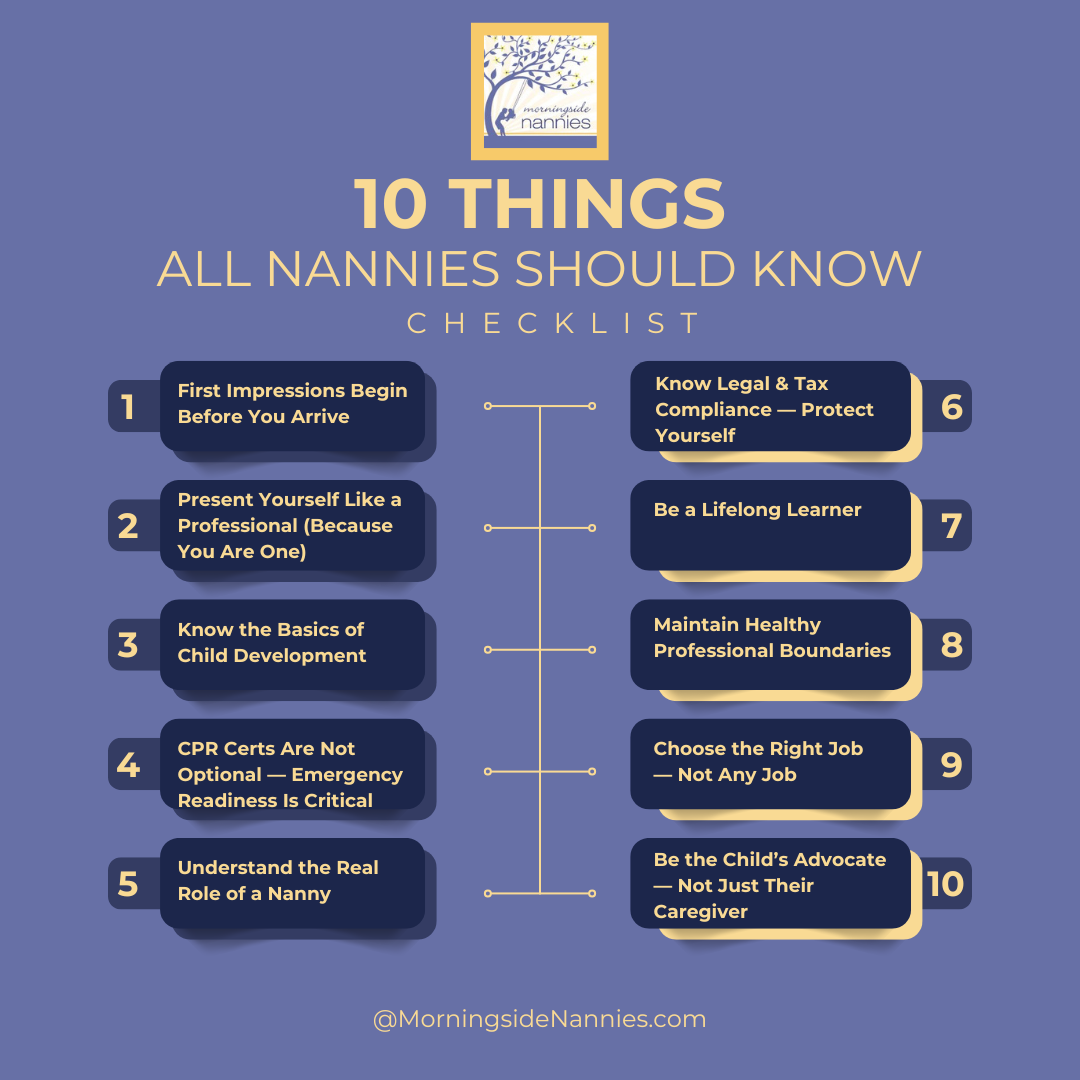10 Things Every Nanny Should Know
 by Michelle LaRowe
by Michelle LaRowe
In today’s modern care landscape, professional nannies are not simply babysitters — we are educators, nurturers, advocates, and trusted partners to the families we serve. The most successful nannies don’t get there by accident; they are intentional, informed, and continuously improving. Whether you’re just starting or you’ve been in this field for years, mastering the following ten areas will set you apart as a true professional.
First Impressions Begin Before You Arrive
Parents decide if you feel right for their family long before you ever speak — and sometimes before you even knock on the door. Be early. Make eye contact. Smile. Offer a confident handshake. Be prepared to discuss their child, not just your résumé. Small details signal huge things to parents: Are you alert? Polished? Calm? Kind?
Competency goal: Practice a 30-second “I’m so glad to meet you — here’s what I value in childcare” introduction. Always walk in as if you’re already the one they trust.
Present Yourself Like a Professional (Because You Are One)
From your email responses to your social media presence, families are evaluating professionalism at every touchpoint. Dress appropriately for an active childcare provider, but tidy. Speak with courtesy and clarity. Follow through. Treat scheduling, communication, and boundaries the way a teacher, nurse, or other professional would — because nannies are within that level of responsibility.
Competency goal: Audit your communications and social media footprint — would you hire you?
Know the Basics of Child Development
Every nanny should understand developmental milestones, realistic expectations, and red flag indicators. You should know what secure attachment looks like, what social-emotional learning is, and how children learn through play.
Competency goal: Be able to answer, confidently and specifically, “What should a 12-month-old be exploring right now? How have you spent your day with a 4-year-old?
CPR Certs Are Not Optional — Emergency Readiness Is Critical
If something happened — could you act confidently, not just correctly? CPR/First Aid is the bare minimum. True readiness means knowing where EpiPens are, rehearsing fire exit plans, understanding allergies, recognizing silent choking, and being calm under pressure.
Competency goal: Annually refresh your training and verbally walk parents through your emergency protocols.
Understand the Real Role of a Nanny
You are not a housekeeper, assistant, or cousin with flexible availability — you are a childcare professional responsible for the wellbeing, development, and daily experience of a child. That means partnering with parents, not replacing them — and never overstepping into decision-maker territory. When you see job creep, speak up. Today’s favor becomes tomorrow’s chore.
Competency goal: Be able to articulate your role as care partner, not employee waiting for direction.
Know Legal & Tax Compliance — Protect Yourself
Legal pay matters — not only for employers, but for your future. Social Security credits, unemployment eligibility, FMLA, mortgage approvals — all depend on legal pay. Understand overtime law. Request a written work agreement. Value your own professionalism enough to insist on doing things right.
Competency goal: Know how W-2 vs. 1099 works for household employees — and why 1099 is almost always wrong. Consider recommending a nanny payroll company to use if your work family does not have one.
Be a Lifelong Learner
Good nannies help with care. Great nannies stay updated on nutrition, sensory needs, Montessori vs. RIE, trauma-informed care, emotional coaching, and early literacy strategies. You want families to say, “She knows more about children than we do.”
Competency goal: Take at least one formal course every year — and tell your employers when you do. Join the International Nanny Association or enroll in training at NannyTraining.com. Your employer may be willing to offset associated costs.
Maintain Healthy Professional Boundaries
You can be loving without being enmeshed, flexible without becoming resentful, and deeply invested without becoming responsible for everything. You are not “on call.” You deserve time off. And yes — no is a professional word.
Competency goal: Be able to kindly say, “I want to give you my best — here’s what I need in order to do that.”
Choose the Right Job — Not Any Job
Not every family is your family. Know your non-negotiables: schedule, values, travel, parenting philosophies, number of kids, energy level. If you’re interviewing desperately, you are already negotiating against yourself.
Competency goal: Create a written list of “Ideal Fit / Potential Fit / Do Not Accept” criteria and ensure the model of care you provide aligns with what the family is seeking.
Be the Child’s Advocate — Not Just Their Caregiver
You may be the only one who sees what a child is really communicating. If something feels off — emotionally, medically, developmentally — it is your ethical duty to speak up respectfully, early, and supportively. Advocacy is not confrontation — it is love in action.
Competency goal: Learn how to document observations and bring them to parents neutrally and supportively (“I’m noticing…” not “your child is…”).
The Bottom Line:
Nannying is not a side job — it is a profession. And the nannies who rise above are the ones who take ownership of that truth — confidently, proudly, and intentionally.
Michelle LaRowe brings to Morningside Nannies more than 30 years of nanny industry experience. An International Nanny Association credentialed nanny and Nanny of the Year award recipient, Michelle has authored several parenting books including Nanny to the Rescue! and Working Mom’s 411. Michelle has served as a board member and as the executive director of the International Nanny Association and she serves as the lead educator at NannyTraining.com and GlobalNannyTraining.com, educating nannies in over 30 countries across the globe. Michelle also is the editor of Nanny Magazine, the industry’s premiere trade publication.
← 5 Things That Make Nannies Crazy | 10 Holiday Questions Nanny Employers Ask →
Comments are closed.



